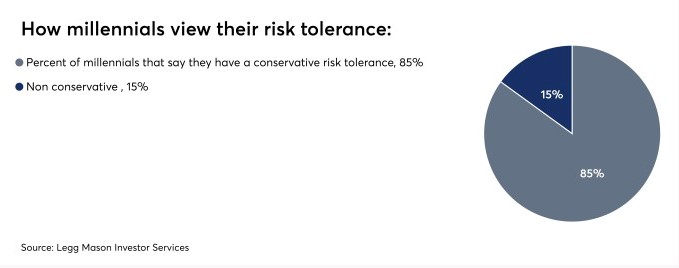Born in the 80s and 90s and numbering some 71 million in the United States alone, Millennials are big on saving but not so big on investing, and brokers are worried about the fate of $30 trillion this and the previous generation are set to inherit.
Millennials are holding their cash close to their hearts, because they came of age during a financial crisis. Now, they’re easily spooked, having watched their parents lose big in 2008, when the S&P 500 lost 57 percent of its value.
They remember the effects of crash and burn well.
Not even rich Millennials are keen on investing, and it’s not because they view the stock market in a particularly negative light.
According to Merrill Edge, a survey of over 1,000 wealthy Millennials speaks volumes: Over 66 percent said they would be able to rely on their savings account in 20 years.
And one in six have savings of $100,000.
According to a survey by Personal Capital, despite the fact that 67 percent of affluent Millennial investors think the market will be even better this year than last, 25 percent of wealthy Millennials still keep the bulk of their net worth in cash.
That’s a lot higher than other generations—even more than skeptical Generation Xers and Baby Boomers. Overall, 19 percent of the wealthy keep their worth in cash.
Almost 85 percent of Millennials say they "play it safe" with their day-to-day investments, while half of them say they're more financially conservative than their parents.

(Click to enlarge)
And when they do invest, often they’re looking to make a difference with their money with “impact investing”. They prioritize social and environmental issues in their investment choices. Related: Consumer Confidence Fails To Boost Retail Sales
Studies claim that more than 85 percent of millennial respondents expressed an interest in or owned social impact investments.
The Millennial aversion to investing is an issue that’s stumped and frustrated brokers for years. The great game now is to figure out what will bring younger generations to the market—and keep them there.
Millennials and their Gen-X predecessors are set to inherit some $30 trillion in the coming years, and the fear is that they will grow bored with their parents’ brokers.
Now, it’s all about getting their attention, and speaking their language before that $30 trillion goes elsewhere.
TD Ameritrade, Facebook, E*Trade, Morgan Stanley, Bank of America and Merrill Lynch are all trying out new digital efforts that would give their financial services a Millennial-style facelift. So far, they believe that personalization may be the key to gaining trust. But personalization isn’t going to be personal—it’s artificial intelligence all the way.
Trust is something they don’t have—yet. According to a Facebook study, only 8 percent of Millennials would trust advice from financial institutions.
The same study showed that Millennials are two-and-a-half times more likely than older generations to use a robo-advisor for wealth management.
Brokerages might have to wait for what comes after ‘Y’: Generation Z, or ‘post-Millennials’, are expected to be much more interested in the stock market, and surveys have shown this is the generation most motivated by money.
By Charles Benavidez for Safehaven.com
More Top Reads From Safehaven.com:
















